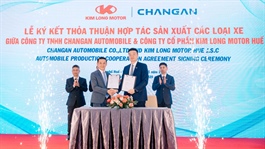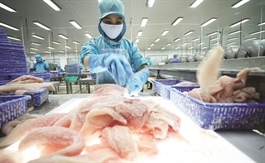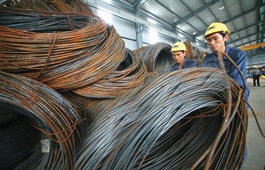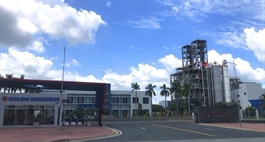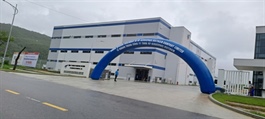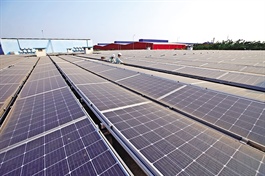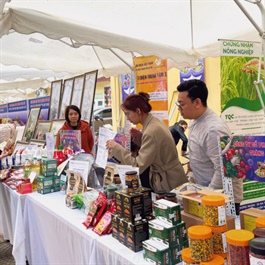Sci-tech plans made clear in resolution
Sci-tech plans made clear in resolution
With new legislation and noteworthy policies on sci-tech and innovation expected this year, businesses are hoping the right moment to start new initiatives will be near.
The Ministry of Science and Technology (MoST) is floating ideas for the draft Law on Science and Technology before submitting it for approval. The draft is expected to include unprecedented incentives and policies as well as a pilot for new business models, to help boost the commercialisation of sci-tech research.

Vietnam has placed massive priority on high-tech development of AI and semiconductor manufacturing, Source: Shutterstock |
The pilot mechanism will revolve around advanced technologies such as AI, big data, and semiconductors.
Nguyen Thi Ngoc Diep, director of the MoST’s Legal Department, told VIR last week, “The draft has a controlling mechanism, which is the permission to carry out a process including testing, evaluation, optimisation, and reporting responsibility. The law will regulate generally, but for specific business lines there will be specific mechanisms.”
Last month, Resolution No.57-NQ/TW was issued as a big push for the sci-tech sector to fast-track the building of related laws. Resolution 57 establishes science and technology as the foundation for Vietnam’s development. Coupled with digital transformation, it represents a shift in Vietnam’s approach to economic growth, aiming to create a more innovative production landscape.
Diep said that to promptly roll out Resolution 57, the MoST is coordinating with ministries and agencies on amendments to laws to ensure commercialisation of scientific research results and development of the sci-tech market.
“Some issues such as risk acceptance mechanism, delay, and controlled testing mechanism are expected to contribute to forming a legal corridor suitable for new scientific, technological and innovative activities,” she added.
Resolution 57 illustrates the country’s determination to breathe fresh air into the market. The resolution will have an open approach, allow experimentation, accept risk, and speed up scientific research, tech development, and innovation.
“There must be a pilot mechanism for enterprises to test new technologies under state supervision,” the resolution states. “There is a policy of exemption from liability for enterprises, organisations, and individuals in the case of testing new technologies and business models that cause economic losses due to objective reasons; and forming venture capital funds for innovative startups, technology incubation, and digital transformation.”
The MoST said that commercialisation of scientific research results and intellectual property had been a long-standing problem due to poor regulations, leading to risks, and concerns among organisations.
To pave the path for building legislation for the pilot mechanism, the MoST and Ho Chi Minh City Party Committee in March 2024 issued a programme on enhancing cooperation in directing and operating sci-tech and innovation, and piloting a number of policies for new products and services in the city towards 2028.
At present, they are developing a pilot scheme to boost commercialisation, bringing into production research results and intellectual property with funding from the state; and developing a mechanism for controlled testing of new products, services, and business models, all based on scientific, technological, and innovative achievements.
They are also piloting a financial mechanism using state funding to support laboratories, innovation support centres, innovative startups, and sci-tech organisations.
An official of the MoST said, “These works are being carried out and we will continue to evaluate the process and learn experience to make further steps.”
Pham Hong Quat, director general of the MoST’s National Agency for Technology Entrepreneurship and Commercialisation Development, said, “Many regulations cannot be resolved immediately due to the long time it takes to amend laws, so it is necessary to apply this pilot policy in Ho Chi Minh City and in some research institutes and universities. On that basis, the MoST will propose a policy to be applied nationwide.”
There is also a pilot mechanism allowing education establishment and institutes to establish businesses to commercialise sci-tech results. “We are also proposing a similar pilot mechanism for the northern city of Haiphong,” Quat added.
Technology expert Hoang Tien said that other nations have their own pilot mechanisms and have made success with new business models, and so it is time for Vietnam to do the same.
“The moves are bold and strong, pinning high hopes among the business community and organisations on new opportunities to commercialise sci-tech results, develop new business models, and make venture investments in the local market. However, they have to wait until the draft law is submitted to the National Assembly for approval first.”
|
Do Quynh Hoa, deputy director, International Cooperation Department, Ministry of Science and Technology
In the era of the Fourth Industrial Revolution, international cooperation in science, technology, and innovation plays an important role in research, tech transfer, high-tech investment, and enhancing international experience sharing, especially in emerging fields. The orientation of international partnerships and integration activities on sci-tech and innovation in 2025 will continue to closely follow and serve the key tasks of the Ministry of Science and Technology (MoST), effectively implementing relevant directives, especially implementing the group of tasks on strengthening international cooperation as stated in Resolution No.57-NQ/TW from December. The top strategic technology trends in 2025 are forecast to include AI, the semiconductor value chain, multi-functional robots, space tech, quantum computing, and biotechnology. In particular, AI continues to develop strongly with the support of leading countries such as the United States and China, through safety management policies and global cooperation strategies. To quickly grasp global trends and develop sci-tech and innovation, the MoST will boost international integration with specific focuses. We will accelerate implementation of agreements on science, technology, and innovation, focusing on key areas and collaboration in AI, semiconductors, and nuclear energy. The ministry will also promote negotiations and the signing of agreements and mutual recognition on Halal certification, support the innovative startup ecosystem, and develop businesses based on intellectual property. Implementing the results of intergovernmental and joint commissions is importamt, as well as other meetings in 2025 with partners such as China, Israel, South Korea, the United States, Russia and others. We will continue to negotiate towards signing documents on sci-tech and innovation with France, New Zealand, the United Kingdom, and the European Union Delegation to Vietnam. We will extensively participate in international organisations and forums, thereby contributing to shaping regional and global policies, therefore enhancing Vietnam’s role in science, technology, and innovation in bilateral and multilateral organisations and forums such as ASEAN, APEC, UNESCO, the United Nations, and others. Through multilateral mechanisms, we aim to hold forums on science and technology with the participation of countries, international organisations, and tech companies to enhance international cooperation, management, and governance. We also will take advantaging of international experience in building laws, especially the Law on Science, Technology, and Innovation, and the Law on Nuclear Energy. In early January, Amandeep Singh Gill, Under-Secretary-General of the United Nations for Digital and Emerging Technologies, visited and worked in Vietnam. Gill praised Vietnam’s vision and in developing tech and suggested that Vietnam should take a more active role in international forums and share practical experiences in developing ethical technology. On the occasion, the MoST also coordinated with the UN to organise a dialogue on governance in AI at Hanoi National University, attracting the participation of many international and domestic delegates and young people. The multilateral event looked at developing responsible AI and building a safe, inclusive, and sustainable AI ecosystem. We will develop and expand the network of sci-tech representatives abroad to promote connection and tech transfer between international research institutes, universities, and enterprises with corresponding units in Vietnam; promote tech diplomacy to contribute to economic diplomacy; and support the connection of large enterprises to invest in Vietnam, especially in development and application of strategic tech such as AI and semiconductors. Another focus will be development and implementation of joint research programmes within bilateral and multilateral agreements, focusing on advanced countries, in order to take advantage of their strengths of modern equipment; and mobilising financial resources from international development funds, ensuring sustainable resources for domestic research and development projects. Priority areas for this include AI, biotechnology, semiconductors, quantum tech, nuclear energy, high-tech agriculture, greenhouse gas emission reduction models, climate change response, and green and digital transformation. Last but not least, the MoST will tap into the network of Vietnamese experts abroad in order to take advantage of valuable knowledge, and paying special attention to attracting those who can support Vietnam in providing experience in building institutions and specialised policies, participating in domestic human resource training, and developing and implementing key national science and technology programmes. |








